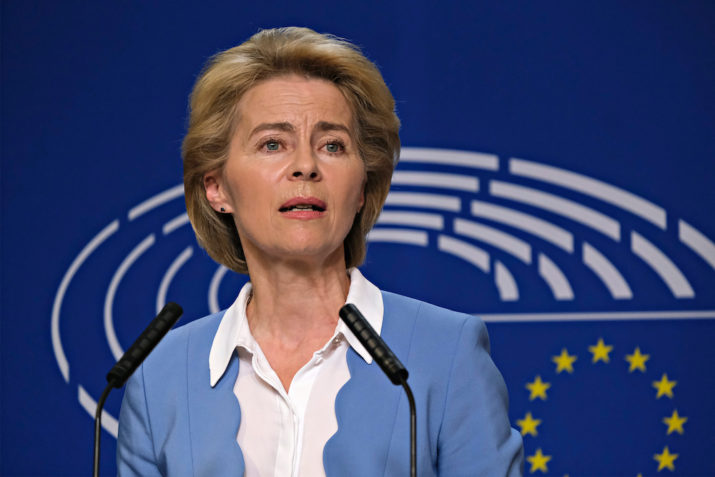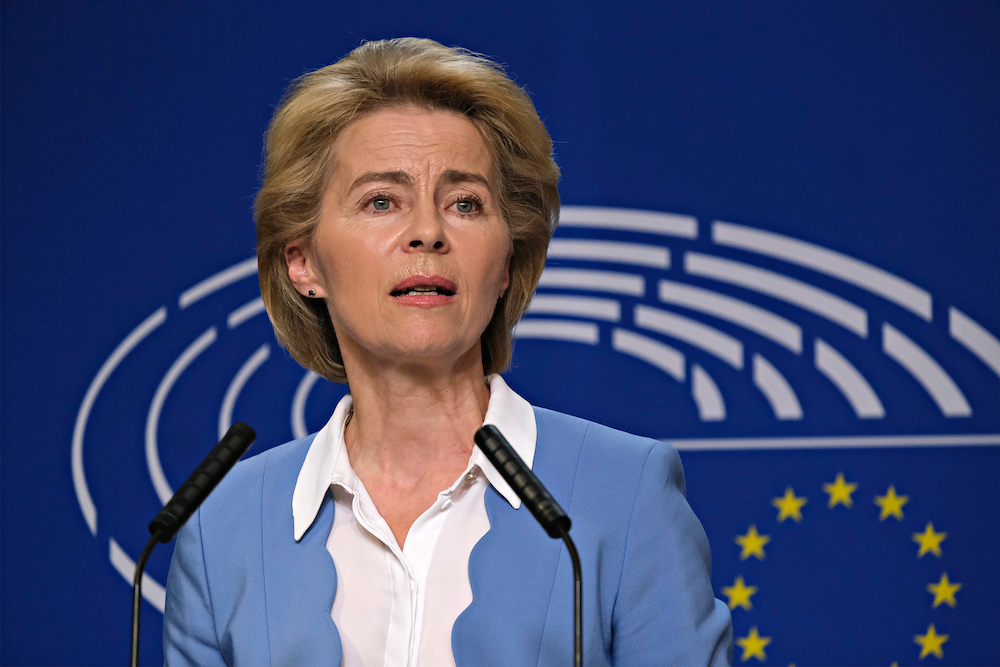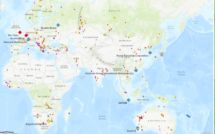

On October 31, 2019, Germany’s Defence Minister, Ursula von der Leyen, was elected in a secret ballot in the European Parliament as the first female carrying the Presidency of the European Commission (Boffey 2019). Following Jean-Claude Juncker’s “political” commission, von der Leyen pledged for a transition to a “geopolitical” one, a Commission allowing “sustainable policies” for the community (Bassot 2020), focusing on the idea of opening up a comprehensive partnership with Africa, helping it develop and gain more investments during the following period (European Commission 2020). At the same time, von der Leyen underlined that the work of her College will be different from her predecessor’s, involving more direct contact with the bloc’s members, through visits of the Commissioners to each Member State during the first half of their mandate, while promoting “paperless and digital” meetings as part of the new plan of digitalisation (European Commission 2019).
The six Political Guidelines specified within von der Leyen’s Agenda for 2019-2024 are focusing on the creation of a European Green Deal, an economy suitable for everyone, Europe’s digitalization, protecting the European way of life, strengthening the power of the Union and improving the European democracy (European Commission 2019).
In terms of structure, the differences between the Juncker commission and von der Leyen are significant. The new President made various changes within the formation of the Commission, making the transition from Juncker’s hierarchical structure to a more inclusive and circular one. Within the preceding Commission, line Commissioners were subordinated to Vice-Presidents having a coordinating role. First, Ursula von der Leyen replaced the First Vice-President position with three Executive Vice-Presidents. Secondly, the number of the Vice Presidents changed from five to eight within her Commission. Third, the number of Commissioners has been reduced from twenty to eighteen. Moreover, the gender balance has been changed, making the transition from Juncker’s commission formed of nineteen males and nine females, to von der Leyen’s team made of fourteen males and thirteen females. Analyzing the political composition, the number of S&D, EPP, ECR and RE (ex-ALDE) members remains similar.
Throughout the first one hundred days in office, the Commission worked to accomplish the urgencies that were vowed: the European Green Deal, the European Climate Law, the risk linked to 5G networks, the Artificial Intelligence and Data Strategy (European Commission 2020). Although unforeseen challenges like the COVID-19 (von der Leyen 2020), the refugee camps in Greece and its ties with Turkey appeared during this period (Boffey 2020), the effort of the Commission continued. The following section examines the top priorities of the Commission, their development and the action plan for the next years.
The European Green Deal
Presented as a plan for Europe to become “the first climate-neutral continent by 2050,” as well as focusing its interest on nature and the issues caused by climate change, the European Green Deal has been the first priority for the new Commission. The proposal covers sectors like transport, energy, agriculture, industries, boosting economies and making them more sustainable for the future. It comprises eight policies centered on cleaner sources of energy, sustainable and environmentally friendly industries, construction, means of transport and food systems, as well as protection of biodiversity and pollution-reduction measures (European Commission 2019).
Considering the roadmap of the Commission for implementing the European Green Deal, key priorities were identified as proposing changes to the legislative measures, laws on climate and ways to reduce pollution (European Commission 2019). On the 14th of January, the European Green Deal Investment Plan and Just Transition Mechanism have been presented, seeking financial support from the member states and external donors, in order to support those regions of Europe which are most affected and unable to implement the scheme (European Commission 2019). Additionally, a Sustainable Europe Investment Plan has been promised, targeting less developed countries in helping them, through funds, to join the carbon-neutralisation plan. A disparity of beliefs has been seen so far between the Western and Eastern Europe, as countries who would benefit more from these funding schemes are in the Eastern part of the continent.
The European Green Deal has been considered one of the most prominent objectives during the first 100-day plan, radically changing the way goods are produced, consumed, and the use of resources. What was delivered so far by the Commission is a comprehensive strategy boosting the EU over its rivals, including the United States and China. Although the volume of policies stated within the deal is impressive compared to the previous ones, the policies themselves need to be strengthened and clarified.
The ambitious plan of decarbonizing the continent within the next three decades could be feasible if investments on changing the industrial mechanism are assured. But convincing countries to adhere to new standards, especially when many of them do not have the financial resources to reach the objectives of the deal could be an impediment. Moreover, the issue is not only addressing the EU member states, but businesses from all over the world based in Europe, which poses the risk of relocating production and high unemployment rates. In order to reach this goal, European businesses will need financial support to put in place specific measures in order to remain competitive within the world industry. Furthermore, as the main goal is switching to a carbon-neutral industry, it means coal-dependent countries like most of the Eastern European block, as well as Germany, should reconstruct their infrastructure and retrain its workers, which further increases the funding needed for the transition and deepening the divide between Western and Eastern Europeans. On the other hand, a strict strategy coming from the Commission should be implemented to restrict false solutions such as gas, CCS and nuclear means.
The Industrial Strategy is based on three key priorities: maintaining the competitiveness of the European industry, and achieving a climate-neutral Europe and digitalisation (European Commission 2020), which poses challenges in terms of bridging the possibility of achieving competitiveness, while protecting the environment. The Industrial Strategy has been revived one more time, but the green approach was missing from the proposal. The modernization process will unquestionably be a costly and long-lasting one, therefore an actual solution would not be seen too soon. Complementary to this Strategy is the Circular Economy Action Plan, which focuses on sustainable use of resources based on high-level sectors such as textiles and construction.
Pledging to become the first climate-neutral continent by 2050, the Commission aimed at adopting a European Climate Law in its first 100 days in office (European Commission 2019). Presented on the 4th of March and open for public consultation until the end of May, the proposal sets binding legislation for all EU countries to eliminate the greenhouse gas emissions by 2050 (European Commission 2020). The goals are also too optimistic in relation to the reactions of the member states regarding the Green Deal. Furthermore, the budget for accomplishing this strategy has not been clearly stated within the proposal, and lots of criticism appeared on the side of NGOs involved in protecting the environment (Jordans 2020). Meanwhile, the Commission is also set to develop a Biodiversity Strategy, which proposes new approaches and ambitions to protect and restore the biodiversity of Europe by 2030, but its presentation was delayed by the unprecedented COVID-19 (Europarl 2020).
An Economy that works for people
The second priority comprises policies aimed at supporting the small and medium enterprises (SME), the Stability and Growth Pact, and a fair minimum wage. The Strategy has been promised as being an easier way for these companies to “become large innovators,” while having access to finance and reducing the red tape (European Commission 2019), especially as they represent 99.8 percent of all European companies on the European market (Euractiv 2019) and are expected to be involved in the transition to a more sustainable economy and digitalisation (European Commission 2020).
Preventing the excess of public expenditure of the EU countries has been stated within the Stability and Growth Pact that also offers, as mentioned by the Commission, “full use of the flexibility,” while achieving “more growth-friendly fiscal stance” in the area (European Commission 2019). While simplifying the rules and procedures within the EU institutions might sound like a good idea, it is unlikely to be welcomed by most of the stakeholders as it implies prolonged consultations and agreement between all parties with conflicting interests. Southern nations usually complain about the complexity of the rules, while northern countries think the problem comes when they are enforced (CNBC 2020). Transparency should be the key to success, but as the legislation is too complicated to be understood by member states officials, not to mention the EU citizens, changes should be made gradually (European Commission 2020).
Another legal instrument ensuring a fair minimum wage for each EU workers has been stated by Ursula von der Leyen as a priority for the first one hundred days in office (European Commission 2019) and went through a consultation process initiated by the Jobs Commissioner Nicolas Schmit in January (European Commission 2020). The fair minimum wage plan will probably face negative reactions from certain EU countries where the implementation would not be possible for various reasons, as some are not part of the Eurozone, do not have a legislation regulating national minimum wage (Boffey 2020), or by payment disparities between member states. An EU wide minimum wage would be set most likely in euros, thus leading to deficit rises in non-euro countries, as it will depend on the exchange rate between the national currency and euro. Additionally, businesses based in countries which did not previously regulate the minimum wage would be profoundly affected and unable to cover the costs and maintain their competitiveness on the European market. So far, the Nordic countries expressed their concern regarding Commission’s plan for minimum wage, as it undermines their long-established traditional system of “collective bargaining” (Boffey 2020), which raises concerns about the possibility of reaching consensus among member states in the near future.
The European plan to fight Cancer was not mentioned as a top priority within the first one hundred days of the new Commission, but von der Leyen assured that “as a physician” she plans to tackle the issue of our era, find new ways to prevent the disease, diagnose and treat it (European Commission 2019). Commissioner in charge of Health sand Food Safety, Stella Kyriakides, stated that the EU is determined to offer better benefits concerning health issues for its citizens, and plans to launch the consultation process focusing on other diseases as well (European Commission 2020). Yet, the plan was not developed enough to make a difference, and no effective measures were highlighted during its presentation on the World Cancer Day.
The European Gender Strategy has been a key priority for the von der Leyen Commission during the 100-days challenge, wishing to implement measures for payment transparency between genders, such as equal payments and opportunities, women’s rights and domestic violence. Moreover, the strategy does not imply genuinely new legislation for gender equality, it only relaunched the “women on boards” strategy of 2012, which has been blocked by the Council of the EU (BPW 2017) and the 2014 strategy on “tackling gender-based violence” (García Pére 2014). As the European Gender Strategy lacks actual new legislative proposals, it is not clear how recycling ideas would be beneficial and completed by the end of the year.
A Europe fit for the digital age
As Europe should benefit more from the digital age, the Technological sovereignty plan strives to rely more on the European technologies and develop their vast potential, through a new Data Act and a Single Market for Data, involving between €4-6 billion contribution from the Member States and the Commission (European Commission 2020). However, the strategy might be at risk if companies are not be willing to share data with the public sector and startups, and comply with EU laws, which raises concerns about the feasibility of the proposal. On the other hand, the data sharing within the health sector means a flow of information on patients shared with researchers, opening new ways through which treatment for various diseases could be initiated. Big tech companies such as Facebook and Google will probably continue to be strictly monitored and penalized, not to mention if the data privacy of its users will continue to be shared with external partners.
The Commission’s President pledged to initiate, in the first 100 days in office, “legislation for a coordinated European approach on the human and ethical implications of Artificial Intelligence,” aiming to invest funds from the Multiannual Financial Framework and public and private sectors (European Commission 2019). However, the Commission did not manage to launch the legislative process and, instead, released a “white paper” with oodles of laws desirable for the EU, which are non-binding for industries (European Commission 2020). The issues found within the text of the AI proposal were identified as being the red tape that will block startups to launch applications in the EU market, causing a slow expansion and lowering the chances of development of the AI industry in Europe due to proposed regulations.
Promoting our European way of life
The tasks for promoting the European way of life were assigned to Margaritis Schinas, who will look after skills, education and integration, finding common ground on migration and the security of the Union (European Commission 2019), as he is due to work also on the New Pact on Migration and Asylum. Following the 2015 migrant crisis in Europe partially settled through an agreement with Turkey, the new Commissioner must deal with today’s migration challenges at the Greek-Turkish border. Schinas called for a better resource allocation to border controls in order to avoid a second crisis within the EU (Euronews 2020).
In connection to the policy explained above, the Neighborhood and Enlargement, supervised by Olivér Várhelyi, deals with the negotiations on the future accession process in the Western Balkans, as well as with the dialogue with Turkey for ensuring an effective migration in the EU (European Commission 2019). The general contestation of the enlargement plan for Western Balkans has been strong, especially on the French side, which complained, through the voice of the President Emmanuel Macron, that the enlargement process could not be suspended or reversed in case the candidate country is not making enough progress before accession (Wemer 2020). However, the new enlargement proposal seeks to open the negotiations with Albania and North Macedonia, as well as talks related to the economic development and investment plan for the EU-Western Balkans Summit in May this year (European Commission 2020). Pessimistic responses might still come from the enlargement skeptics like the Netherlands and Denmark, on whether they are planning to give Albania and North Macedonia a “green light” (Emmott 2020).
A stronger Europe in the world
The so-called “geopolitical” commission started its work on the new Strategy for Africa during von der Leyen’s first trip as President of the European Commission, the document being published on the 9th of March. A list of various policies has been presented, aiming at building better relations between the EU and Africa and focusing on a greener perspective has been pressed into this relation too, asking to “minimize threats to the environment,” in accordance with the Paris Agreement. Additionally, plans to boost the digitalization and investments inside the African continent were stated, adding the support linked to peace, governance, democracy and human rights (European Commission 2020). Hitherto, the African counterpart agreed on the points of von der Leyen and declared that their partnership is “a very good combination” which will have a considerable impact mutually on the EU countries and in Africa (David M. Herszenhorn 2019). The new Strategy is expected to be endorsed by the EU and African Union at the planned October 2020 Summit.
A new push for European democracy
Supposedly proposing a radical change of how the EU works and elects its President of the European Commission, theConference on the Future of Europe has been identified as a top priority in the Political Guidelines of von der Leyen and is intended to last for two years. It would offer a “greater say” for young Europeans and the civil society, working in an equal partnership with the EU entities (European Commission 2019). Treaty changes were unlikely to be agreed, as most of those involved are unwilling to accept the adjustments, thus the proposal for treaties’ changes has been eliminated (de la Baume 2020). While more involvement of the European citizens within policy implementation in the EU seems like a great prospect for adding different perspectives to the conversation, the actual implementation of such a proposal is difficult to say the least, especially in the context of an already convoluted and precariously balanced EU decision making process. On a more abstract plan, such a proposal would also have to rely on the concept of European citizenship to be above (or at least on the same level with) the national citizenship of Europeans, which was not the case even before the Covid-19 crisis.
“These 100 days were amazing with them, a great team”—Ursula von der Leyen declared at the end of this period (2020). The 100 days challenge of the Commission ended on 9th of March and was followed by a statement of the President who expressed her recognition for the work undertook so far. The Commission had a good start, but most of the work is yet to come since the 100 days were mostly paperwork and consultation with member states than concrete actions towards the assumed Political Guidelines. Moreover, the unprecedent challenges of the novel Corona virus (COVID-19) postponed the policies mentioned within the analysis for an uncertain period.
Diana-Andreea Mandiuc is a doctoral student, studying Politics and International Relations at Cardiff University, United Kingdom. Her research focuses on the online radicalization, the case of the UK female citizens. She recently completed a master’s degree in International Relations (Diplomacy) at the University of Birmingham, UK and is also a Freelance Journalist for several newspapers.
References:
Amaro, S. 2020, “The EU is seeking to heal years of infighting with new spending rules”, CNBC, 5 February, Accessed 16 April 2020, www.cnbc.com/2020/02/05/the-european-commission-is-seeking-to-heal-years-of-infighting-with-new-fiscal-rules.html
Associated Press, 2020, “EU Commission unveils Climate Law amid criticism”, The New York Times, 4 March, Accessed 15 March 2020, www.nytimes.com/aponline/2020/03/04/business/bc-eu-climate-law.html
Bassot, É. 2020, “The von der Leyen Commission’s priorities for 2019-2024”, European Parliamentary Research Service, January, Accessed 15 March 2020,www.europarl.europa.eu/RegData/etudes/BRIE/2020/646148/EPRS_BRI(2020)646148_EN.pdf
Bershidsky, L. 2019, “Poland and Hungary are right to fear the EU’s Green Deal”, Bloomberg, 12 December, Accessed 15 March 2020, www.bloomberg.com/opinion/articles/2019-12-12/poland-hungary-and-czechs-are-right-to-fear-the-eu-s-green-deal
Boffey, D. 2019, “Ursula von der Leyen elected first female European commission president”, The Guardian, 16 July, Accessed 15 March 2020, www.theguardian.com/world/2019/jul/16/ursula-von-der-leyen-elected-first-female-european-commission-president
Boffey, D. 2020, “EU and Turkey hold ‘frank’ talks over border opening for refugees”, The Guardian, 9 March, Accessed 15 March 2020, www.theguardian.com/world/2020/mar/09/turkey-erdogan-holds-talks-with-eu-leaders-over-border-opening
Boffey, D., 2020, “Nordic countries at odds with EU over minimum wage”, The Guardian, 12 January, Accessed 15 March 2020, www.theguardian.com/world/2020/jan/12/nordic-countries-at-odds-with-eu-over-minimum-wage
Business & Professional Women, 2017, “Status of the proposed directive on Women on Boards”, 21 June, Accessed 15 March 2020, www.bpw.fr/files/7115/4327/0540/Brief_Women_on_Boards_Directive-June2017.pdf
De la Baume, M. 2020, “Conference on the Future of Europe: Don’t mention the T word”, Politico, 21 January, Accessed 15 March 2020, www.politico.eu/article/conference-on-the-future-of-europe-dont-mention-the-treaty-word-european-commission-parliament-ursula-von-der-leyen/
Emmott, R. and Baczynska, G. 2020, “EU to overhaul process for admitting new members in bid to lift French veto”, Reuters, 4 February, Accessed 15 March 2020, www.reuters.com/article/us-eu-balkans/eu-to-overhaul-process-for-admitting-new-members-in-bid-to-lift-french-veto-idUSKBN1ZY198
Euronews, 2020, “Greece should ‘respect international law amid border crisis’, says EU”, Euronews, 4 March, Accessed 16 April 2020, www.euronews.com/2020/03/04/greece-should-respect-international-law-amid-border-crisis-says-eu
European Commission, 2019-2020, “Press Releases and Strategies”
European Council, 2020, “COVID-19 – Council adopts measures for immediate release of funds”, Accessed 16 April 2020, www.consilium.europa.eu/en/press/press-releases/2020/03/30/covid-19-council-adopts-measures-for-immediate-release-of-funds/
European Parliament, 2019, “Parliament elects the von der Leyen Commission”, Accessed 16 April 2020, www.europarl.europa.eu/news/en/press-room/20191121IPR67111/parliament-elects-the-von-der-leyen-commission
Herszenhorn, D. 2019, „Von der Leyen ventures to the heart of Africa”, Politico, 8 December, Accessed 15 March 2020, www.politico.eu/article/european-commission-president-ursula-von-der-leyen-ventures-to-the-heart-of-africa-ethiopia-african-union/
Keating, D. 2019, “Von Der Leyen urged to prioritise single market to counter slowdown”, Euractiv, 25 November, Accessed 16 April 2020, www.euractiv.com/section/competition/news/von-der-leyen-urged-to-prioritise-single-market-to-counter-slowdown/
Pérez, I. 2014, “EU needs strategy for tackling gender-based violence”, The Parliament Magazine, 24 November, Accessed 15 March 2020, www.theparliamentmagazine.eu/articles/opinion/eu-needs-strategy-tackling-gender-based-violence
Simon, F. 2019, “Gas industry storms into EU green finance taxonomy debate”, Euractiv, 16 October, Accessed 15 March 2020, www.euractiv.com/section/energy-environment/news/gas-industry-storms-into-eu-green-finance-taxonomy-debate/
Von der Leyen, U. 2019, “A Union that strives for more. My agenda for Europe: Political guidelines for the next European Commission 2019-2024”, Accessed 15 March 2020, https://ec.europa.eu/commission/sites/beta-political/files/political-guidelines-next-commission_en.pdf
Von der Leyen, U. 2020, “Working together with @eucopresident Charles Michel and Member States on coordinating effective measures at the internal and external EU borders to protect peoples’ health, reduce the spread of #coronavirus and maintain the flow of goods and services within the #EU.”, Twitter, 14 March, Accessed 15 March 2020, https://twitter.com/vonderleyen/status/1238846417478828038?s=20
Wemer, D. 2020, “Will the Commission’s new EU proposal revive Western Balkans Enlargement”, New Atlanticist, 10 February, Accessed 15 March 2020, www.atlanticcouncil.org/blogs/new-atlanticist/will-the-commissions-new-eu-proposal-revive-western-balkans-enlargement/
Photo: Brussels, Belgium. 10th July 2019. Ursula von der Leyen the nominated President of the EU Commission and President of the EU Parliament David-Maria Sassoli give a press briefing.
Published on August 4, 2020




